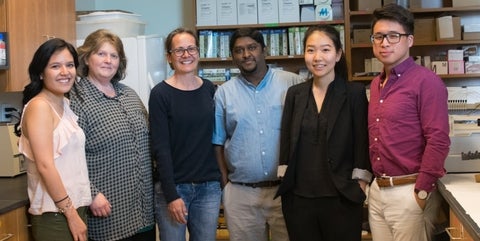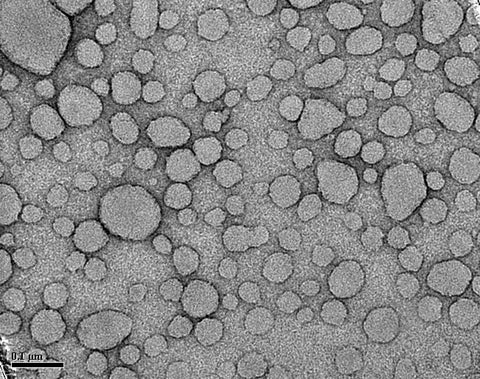On November 10, Professor Marianna Foldvari received an award for Outstanding Lifetime Achievements in Nanoscience from Nano Ontario, an organization that represents Ontario’s nanotechnology community. She then travelled to San Diego to be appointed a Fellow of the prestigious American Association of Pharmaceutical Sciences (AAPS). These honours recognize Foldvari’s accomplishments in pharmaceutical sciences and nanomedicine research.

The Foldvari lab group: Daniella Calderon, Marianna Foldvari, Carla Sciarretta, Lokesh Narsineni, Monica Chung and Ding-Wen (Roger) Chen.
Foldvari was one of Waterloo Pharmacy’s first faculty members, hired in 2006. Originally trained as a pharmacist at Semmelweis University in Hungary, she has studied and worked at universities across Canada. When she arrived at the University of Waterloo, her research and leadership capabilities were recognized with an appointment as a Canada Research Chair in Bionanotechnology and Nanomedicine and as the School’s first Associate Director of Graduate Studies and Research.
Foldvari researches non-invasive gene therapy and drug delivery. Her lab uses nanotechnology to explore non-invasive intradermal (through the skin) and intraocular (into the back-of-the eye) methods of delivering biotech drugs into the body. These innovative methods can revolutionize treatments for dermatological diseases, vaccines and eye diseases such as glaucoma. Glaucoma has been the focus of much recent research in her lab group.
“Currently, patients with glaucoma are treated through pharmacotherapy, laser treatment, or surgical intervention” explains Ding-Wen (Roger) Chen, a PhD student the Foldvari lab. “These interventions focus on reducing intraocular pressure but do not address protecting the retina or reversing eye damage. We are exploring gene therapy as a means of achieving these outcomes.”
Lokesh Narsineni, also a PhD student in the Foldvari lab, develops nanotechnology delivery systems for the gene therapy that Chen is working on. Narsineni explains:
“My research explores nanotechnology solutions to gene therapy delivery. The goal is to make this therapy safer, more effective and possible without needle injection. We are examining topical delivery methods such as eye drops that will make delivery of the therapeutic gene to the posterior segment of eye more comfortable for patients.”

Gemini nanoparticles as seen through an electron microscope.
Foldvari and her lab are some of only a handful of researchers worldwide focusing on non-invasive gene therapy and nanomedicine-based large drug molecule delivery. The NanoOntario Lifetime Achievement award recognizes Foldvari’s leadership in the field over her career: she has over 150 peer-reviewed research papers in print and has given over 200 presentations at national and international conferences.
But what Foldvari and her team most excel at is the challenging task of translating research discoveries into clinical applications. Many technologies developed in her lab resulted in patents and have become start-ups or moved forward for commercial development. Her work with Chen and Narsineni is an example of this: the researchers have formed a company where they will focus on developing their nanotech inventions made in the lab into nanomedicines for neurodegenerative vision loss such as glaucoma.
The importance of Foldvari’s research is recognized in the approximately $23 million dollars in grant funding her work has received over her career and in the international nominations that resulted in her appointment as Fellow of AAPS. She continues to be a leader in her field and an inspiration to her students.